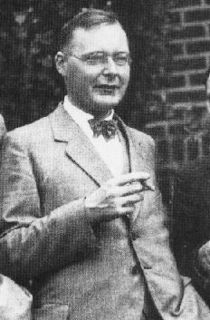A Quote by Hans Kramers
In the world of human thought generally, and in physical science particularly, the most important and fruitful concepts are those to which it is impossible to attach a well-defined meaning.
Related Quotes
Understanding human nature must be the basis of any real improvement in human life. Science has done wonders in mastering the laws of the physical world, but our own nature is much less understood, as yet, than the nature of stars and electrons. When science learns to understand human nature, it will be able to bring a happiness into our lives which machines and the physical sciences have failed to create.
One cannot ignore half of life for the purposes of science, and then claim that the results of science give a full and adequate picture of the meaning of life. All discussions of 'life' which begin with a description of man's place on a speck of matter in space, in an endless evolutionary scale, are bound to be half-measures, because they leave out most of the experiences which are important to use as human beings.
An enormous amount of modern ingenuity is expended on finding defences for the indefensible conduct of the powerful. As I have said above, these defences generally exhibit themselves most emphatically in the form of appeals to physical science. And of all the forms in which science, or pseudo-science, has come to the rescue of the rich and stupid, there is none so singular as the singular invention of the theory of races.
Mysticism is a rational enterprise. Religion is not. The mystic has recognized something about the nature of consciousness prior to thought, and this recognition is susceptible to rational discussion. The mystic has reasons for what he believes, and these reasons are empirical. The roiling mystery of the world can be analyzed with concepts (this is science), or it can be experienced free of concepts (this is myticism). Religion is nothing more than bad concepts held in place of good ones for all time. It is the denial-at once full of hope and full of fear-of the vastitude of human ignorance.
The usual method of creation for most human beings is a three-step process involving thought, word, and deed or action. First comes thought; the formative idea; the initial concept. Then comes the word. Most thoughts ultimately form themselves into words, which are often then written or spoken. This gives added energy to the thought, pushing it out into the world, where it can be noticed by others. Finally, in some cases words are put into action, and you have what you call a result; a physical world manifestation of what all started with a thought.
The branches of mathematics are as various as the sciences to which they belong, and each subject of physical enquiry has its appropriate mathematics. In every form of material manifestation, there is a corresponding form of human thought, so that the human mind is as wide in its range of thought as the physical universe in which it thinks.
No science of any kind can be divorced from ethical considerations... Science is a human learning process which arises in certain subcultures in human society and not in others, and a subculture as we seen is a group of people defined by acceptance of certain common values, that is, an ethic which permits extensive communication between them.

































